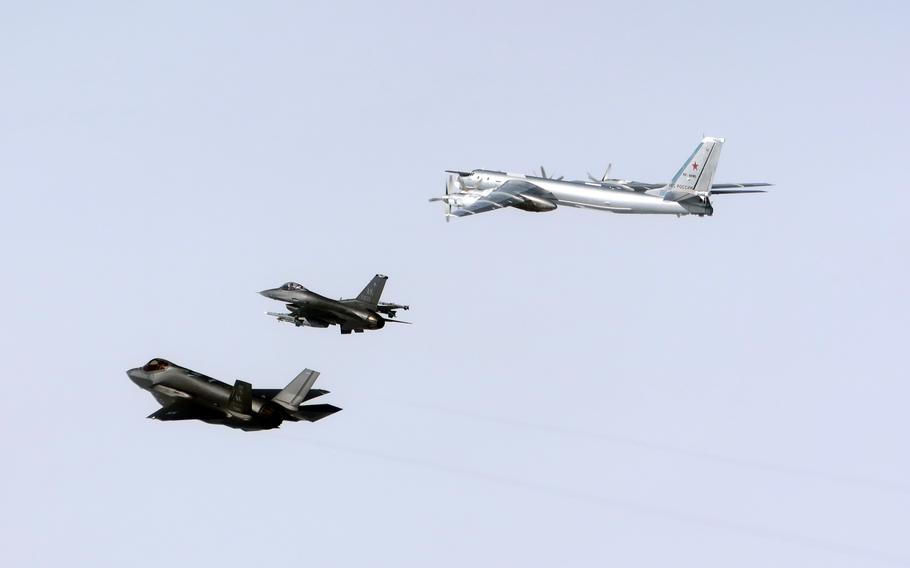
Fighters with North American Aerospace Defense Command, or NORAD, intercept a Russian Tu-96 strategic bomber in the Alaska Air Defense Identification Zone, July 24, 2024. (North American Aerospace Defense Command)
Former Rep. Jane Harmon, co-chair of the congressionally mandated Commission on the National Defense Strategy to assess the viability of America’s defense strategy, warned in a just-released report that the security environment for the United States is “blinking red.” While the report details a number of valid concerns, it is what the report doesn’t say that should be most alarming.
There is a major and alarming imbalance between the United States’ stated strategic objectives and the resources necessary to attain them. This imbalance cannot be rectified by spending more money on national defense. What is needed — desperately needed — is an immediate recognition that without major changes in our foreign policy and military capacity, we place our very national security at unacceptable risk.
The report warns that since Russia’s invasion of Ukraine in 2022, the “no-limits” partnership between China and Russia “has only deepened and broadened to include a military and economic partnership with Iran and North Korea.” This new alignment of nations opposed to U.S. interests, the report continued, “creates a real risk, if not likelihood, that conflict anywhere could become a multi-theater or global war.”
America, the authors contend, “is unable to meet the equipment, technology, and munitions needs of the United States and its allies and partners,” to engage in such a global fight. To change that dynamic, they argue the U.S. needs to create “much greater capacity to produce, maintain, and replenish weapons and munitions. Addressing the shortfall will require increased investment, additional manufacturing and development capacity, joint and coproduction with allies, and additional flexibility in acquisition systems.”
As evidence of how significant is the gap between national strategy and capacity, the report cites recent wargames that reveal the Pentagon could deplete its key ammunition stocks in a major war with China over Taiwan in “three to four weeks.” Anti-ship missiles could be exhausted in a few days. Replacing these expended munitions, the report concludes, “would take years.”
After accurately exposing the significant lack of industrial capacity to fight a war against China, one would expect the authors to recommend an appetite suppressant and scale back our ambitions to match our capacity. Instead, counterintuitively and inexplicably, the report recommends the U.S. armed forces “be sized and structured to simultaneously”:
Defend the homeland. Maintain a global posture. Deter China from taking territory in the Indo-Pacific “and fight and win if needed.” Lead NATO to deter “and, if necessary, defeat Russian aggression.” And continue to sustain activities in the Middle East and be ready to fight Iran. To fund the capacity to perform these missions, unsurprisingly, the report’s authors recommend a “significant increase” in defense spending.
Don’t miss the mammoth implications of what this report suggests. They openly admit that if the U.S. got into a fight with China over Taiwan — just the one fight — we would run out of key ammunition categories in mere weeks. The congressionally mandated authors then inexplicably suggest we need to expand our mission set to be able to “simultaneously” fight and defeat China, Russia and Iran, while defending our border and maintaining a global posture!
To create that capacity, the United States would have to go on a major, World War II-style full industrial mobilization (not to mention increasing our active forces to possibly triple our current levels), costing trillions of dollars over many years above current defense budget! It should be plain to any normal thinking person that what this report suggests is not only unattainable in both geostrategic and economic terms, but also highly unwise.
What do supporters of this plan think will be the reaction around the world were such a plan put into effect? China and Russia, along with North Korea and Iran, have already been pushed into each other’s arms by our current support to Ukraine and Taiwan. Imagine what they would do if they saw us openly declare a doctrine of building physical capacity needed to defeat each in a war. This axis would, without a doubt, pour resources into deterring — or even matching — our bolstered capabilities. Far from ensuring our security, we would be locked in an escalating cycle of military tensions with nuclear adversaries.
What the United States should do instead is take a sober look at ends and means. We should establish defense priorities aligned with a realistic assessment of reasonable and attainable foreign policy objectives. That means first and foremost acknowledging there are limits to our power. Seeking to be able to fight and win wars against two superpowers and a regional Middle East nation simultaneously comes close to the very definition of irrational thinking.
It should be an imperative that America has a strong, well-funded and fully trained armed force that is able to defend our borders and, along with our allies, defend shared interests around the world if allies are attacked. We should not go in search of dragons to slay. America should seek to create a safe and secure environment that has the best chance of success and at the lowest possible cost. That means significantly elevating diplomacy, adopting an appropriate amount of humility and being open to win-win solutions to global challenges (even when dealing with competitors).
Seeking to secure America by expanding our military capacity along the lines advocated in the Commission on National Defense Strategy will fail. Trying will likely either bankrupt us, or, in the worst case, spark wars against strong adversaries we would otherwise never need to fight. Setting sober defense priorities associated with an achievable foreign policy is a far better option to keep us safe and prosperous.
Daniel L. Davis is a retired U.S. Army lieutenant colonel with four combat deployments. He is currently Senior Fellow for Defense Priorities & host of the Daniel Davis Deep Dive show.